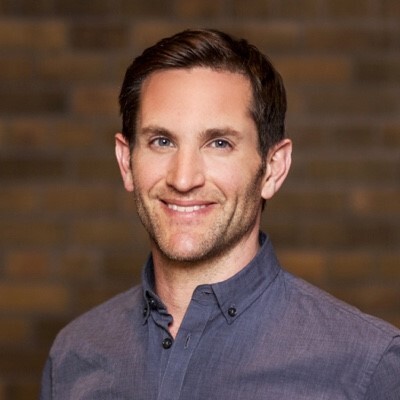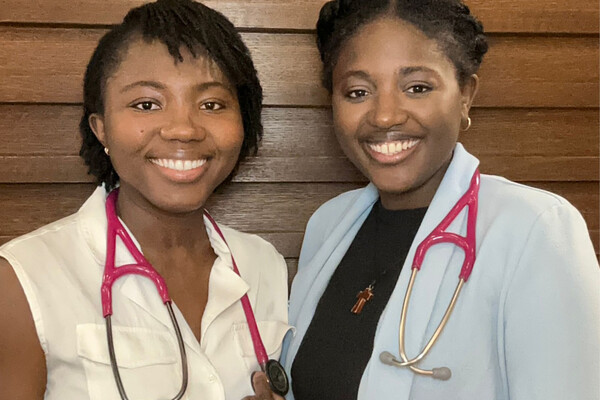Mobile Medicine: Dr. Brett Belchetz Builds Health Care App

Dr. Brett Belchetz, MD ’00, PGME ’04 (Family Medicine) is co-founder and CEO of the virtual health care app, Maple, and a practicing emergency room physician for the Scarborough Health Network. He is also a former management consultant with McKinsey & Company.Dr. Brett Belchetz, MD ’00, PGME ’04 (Family Medicine) is co-founder and CEO of the virtual health care app, Maple, and a practicing emergency room physician for the Scarborough Health Network. He is also a former management consultant with McKinsey & Company.
You don't have to have all the answers or a full view of where your career is going to go. Things are going to take twists and turns that you can never anticipate, and that uncertainty is at least half of the fun.
Dr. Brett Belchetz is the co-founder and CEO of Maple, a platform that connects patients with doctors for virtual health care. He is also a practicing emergency room physician at Scarborough Health Network. We asked him about what drew him to medicine, his unique path in health care and business and his rapidly expanding app.
When did you first know you wanted to be a physician?
I wanted to be a doctor since I was 16 years old. I had this distinct vision of medical practice back then, based on a lot of what are probably the “wrong influences,” like TV shows and movies. I wanted to be a surgeon, based on portrayals of surgery in mass media that made it look like this incredible problem-solving job where the surgeon repeatedly figures out a revolutionary way to fix something in the middle of an operation. That looked so incredible. But the truth of the matter, as I discovered quickly in school, is that if you're improvising in the middle of an operation, that's usually not a good thing.
Did medical school reveal the reality? What did you do next?
After rotating through multiple surgical specialties, I began to realize that surgery wasn’t a good fit for me. It’s a very technical job, and I thrive more in an environment where there are lots of creative challenges, problem solving and opportunities to do new things. At the time, I wasn’t sure what other areas in medicine, besides surgery, interested me, so after medical school I chose to work for McKinsey & Company, a global management consultancy. Working for them, I learned an incredible amount about business, and travelled the world working on huge, impactful projects. But even though I loved the position, I realized after several years that my heart belonged back in health care. So, I came back and completed my family practice residency with a goal to practice emergency medicine.
And what led you to start your company?
After five years of practice, I started to notice the strains in our health care system. Coming from a consulting background where we learned how to improve processes and systems, I saw so many ways we could optimize how we treat people in our system. I became involved in trying to improve the system, serving on committees in my emergency room and hospital.
I started advocating for changes to our health care system, speaking publicly, writing editorials and advocating to governments. But I felt there was so much inertia and entrenched interests in our system that it was very difficult to make any effective change. And that realization is what led me to contemplate starting my company.
Tell us about Maple.
When we started in in 2015, virtual care or telemedicine was really starting to take root around the world, and I thought it could be a really good solution to taking some of the strain off of our Canadian health care system. A lot of people believe that we don't have enough doctors in Canada but that's actually not the truth at all. We have more than enough capacity, we're just not using it very effectively – only 40 per cent of Canadian doctors work full year, full time.
The big obstacle to virtual care in Canada is that it isn't a covered service under provincial health plans across Canada. We debated trying to work with governments for coverage, but quickly realized waiting for this could potentially take years, so we decided to strike out on our own, accepting private payment, to show that virtual care could actually work here. We started the company in 2015, and launched with a small group of physicians, all emergency room colleagues of mine, in 2016.
How does the platform work?
Our platform is open 24 hours a day, seven days a week, and provides patients an almost instantaneous connection to a doctor. Patients see our doctors either by video, instant message, or by phone call, depending on their clinical needs. We have physicians in every province, and they all go through a vetting and training process to learn to see patients virtually. They can see as many or as few patients as they want — some doctors work on our service all day long and others just see a few patients a month. We pay them a fee for service per consultation.
There are definitely some issues that are more appropriate for virtual care than others: prescription renewals, urinary tract infections, sinus infections, conjunctivitis, skin issues are all good use cases. We also service a lot of mental health and sexual health visits. Around 50 to 70 per cent of medical issues can be treated virtually without a hands-on physical exam, and we have a built-in triaging mechanism in our application, so every single request is pre-assessed by a doctor for appropriateness.
How has the company grown and what are next steps?
We launched in Ontario and we've grown really quickly. We now operate across Canada: we have well over 300 health care providers on the platform and over 300,000 patients. We're doing thousands of visits every month and that number grows by about 15 percent every month, and we’ve seen an exceptional rate of satisfaction from our patients.
What's fantastic is that governments are starting to take notice. For instance, in Prince Edward Island we now have a long-term contract with the government where we're virtually staffing hospitals for them. And we're very close to potentially offering the same service for several rural hospitals here in Ontario. We’ve been getting inquiries from rural hospitals across the country, as well as from hospitals in Asia and the United States.
We've also launched our first virtual specialties, with a network of mental health therapists and dermatologists, and we're considering several other specialties, such as oncology and endocrinology. The goal eventually is for Maple to be a platform for all manner of medical specialties to offer virtual care, not just primary care.
What excites you about your career now?
I still practice clinically, not as much as before, as it's hard to run a company and work full time, but I love the clinical practice that I have, and I enjoy those days. I also love running my business, because it brings together all of the things in business and healthcare and public policy that I'm passionate about. Every single day I engage in problem solving and I never know what the challenges are going to be. I'm working on things I really care about, and success here has the potential to mean better healthcare access for all Canadians.
What advice would you have for medical students?
Having a medical degree opens a ton of doors for you. While there is a well-defined pathway in front of you to practice as a doctor, if you're open to exploring and doing other things, don't be afraid of being different and taking chances. Also, you don't have to have all the answers or a full view of where your career is going to go. Things are going to take twists and turns that you can never anticipate, and that uncertainty is at least half of the fun. If you open yourself up to all the different opportunities in front of you, chances are you’ll end up with a far more interesting and fulfilling career.
— In conversation with Suzanne Bowness
News


